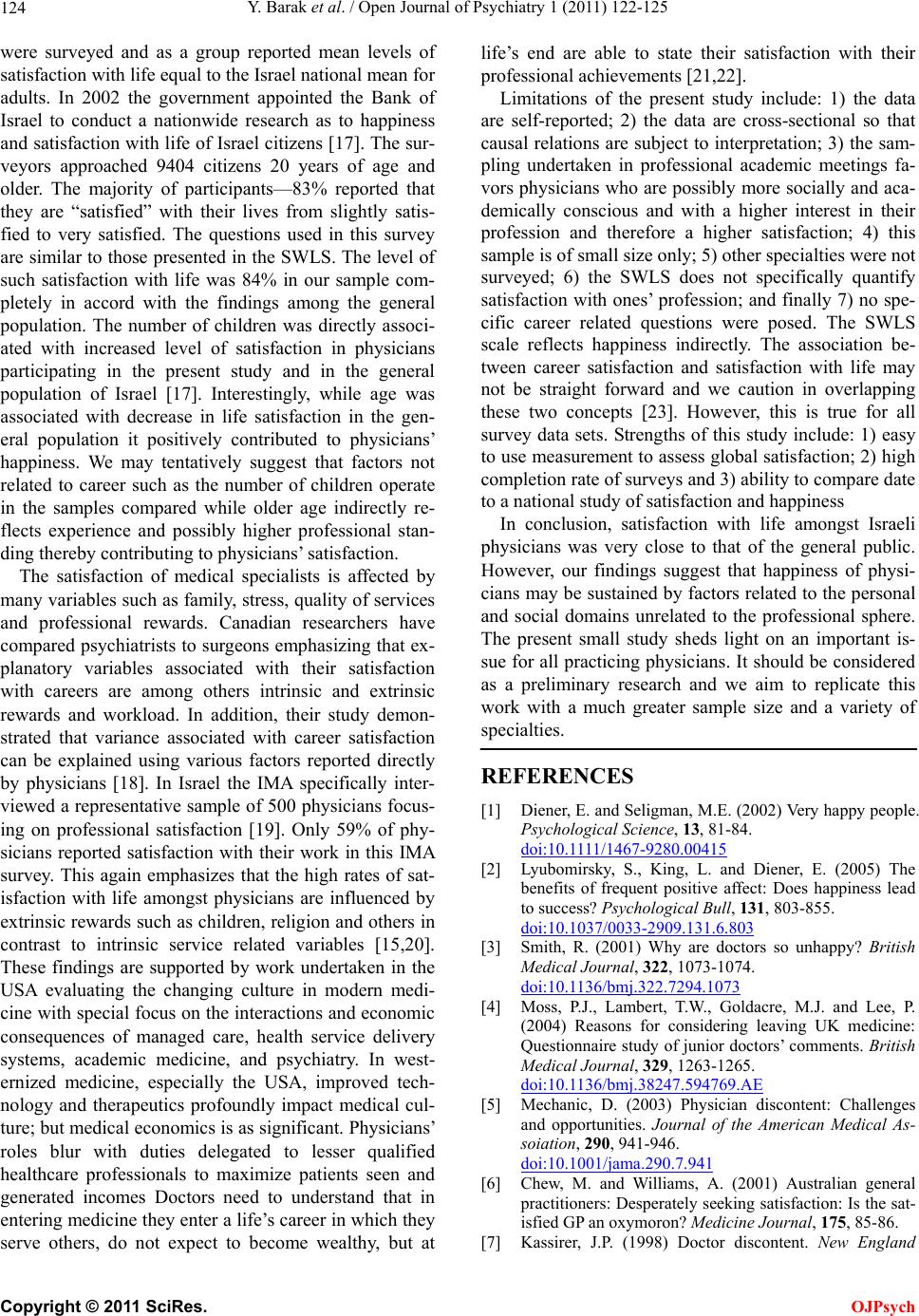
Y. Barak et al. / Open Journal of Psychiatry 1 (2011) 122-125
124
were surveyed and as a group reported mean levels of
satisfaction with life equal to the Israel national mean for
adults. In 2002 the government appointed the Bank of
Israel to conduct a nationwide research as to happiness
and satisfaction with life of Israel citizens [17]. The sur-
veyors approached 9404 citizens 20 years of age and
older. The majority of participants—83% reported that
they are “satisfied” with their lives from slightly satis-
fied to very satisfied. The questions used in this survey
are similar to those presented in the SWLS. The level of
such satisfaction with life was 84% in our sample com-
pletely in accord with the findings among the general
population. The number of children was directly associ-
ated with increased level of satisfaction in physicians
participating in the present study and in the general
population of Israel [17]. Interestingly, while age was
associated with decrease in life satisfaction in the gen-
eral population it positively contributed to physicians’
happiness. We may tentatively suggest that factors not
related to career such as the number of children operate
in the samples compared while older age indirectly re-
flects experience and possibly higher professional stan-
ding thereby co ntributing to physicians’ satisfaction.
The satisfaction of medical specialists is affected by
many variables such as family, stress, quality of services
and professional rewards. Canadian researchers have
compared psychiatrists to surgeons emphasizing that ex-
planatory variables associated with their satisfaction
with careers are among others intrinsic and extrinsic
rewards and workload. In addition, their study demon-
strated that variance associated with career satisfaction
can be explained using various factors reported directly
by physicians [18]. In Israel the IMA specifically inter-
viewed a representativ e sample of 500 physicians focus-
ing on professional satisfaction [19]. Only 59% of phy-
sicians reported satisfaction with their work in this IMA
survey. This again emphasizes that the high rates of sat-
isfaction with life amongst physicians are influenced by
extrinsic rewards such as ch ildren, religion and others in
contrast to intrinsic service related variables [15,20].
These findings are supported by work undertaken in the
USA evaluating the changing culture in modern medi-
cine with special focus on the interactions and economic
consequences of managed care, health service delivery
systems, academic medicine, and psychiatry. In west-
ernized medicine, especially the USA, improved tech-
nology and therapeutics profoundly impact medical cul-
ture; but medical economics is as significant. Physicians’
roles blur with duties delegated to lesser qualified
healthcare professionals to maximize patients seen and
generated incomes Doctors need to understand that in
entering medicine they enter a life’s career in which they
serve others, do not expect to become wealthy, but at
life’s end are able to state their satisfaction with their
professional achievements [21,22].
Limitations of the present study include: 1) the data
are self-reported; 2) the data are cross-sectional so that
causal relations are subject to interpretation; 3) the sam-
pling undertaken in professional academic meetings fa-
vors physicians who are possibly more socially and aca-
demically conscious and with a higher interest in their
profession and therefore a higher satisfaction; 4) this
sample is of small size only; 5) other specialties were not
surveyed; 6) the SWLS does not specifically quantify
satisfaction with ones’ profession; and finally 7) no spe-
cific career related questions were posed. The SWLS
scale reflects happiness indirectly. The association be-
tween career satisfaction and satisfaction with life may
not be straight forward and we caution in overlapping
these two concepts [23]. However, this is true for all
survey data sets. Strengths of this study include: 1) easy
to use measurement to assess global satisfaction; 2) high
completion rate of surveys and 3) ability to co mpare date
to a national study of satisfaction and happiness
In conclusion, satisfaction with life amongst Israeli
physicians was very close to that of the general public.
However, our findings suggest that happiness of physi-
cians may be sustained by factors related to the personal
and social domains unrelated to the professional sphere.
The present small study sheds light on an important is-
sue for all practicing physicians. It should be considered
as a preliminary research and we aim to replicate this
work with a much greater sample size and a variety of
specialties.
REFERENCES
[1] Diener, E. and Seligman, M.E. (2002) Very happy people.
Psychological Science, 13, 81-84.
doi:10.1111/1467-9280.00415
[2] Lyubomirsky, S., King, L. and Diener, E. (2005) The
benefits of frequent positive affect: Does happiness lead
to success? Psychological Bull, 131, 803-855.
doi:10.1037/0033-2909.131.6.803
[3] Smith, R. (2001) Why are doctors so unhappy? British
Medical Journal, 322, 1073-1074.
doi:10.1136/bmj.322.7294.1073
[4] Moss, P.J., Lambert, T.W., Goldacre, M.J. and Lee, P.
(2004) Reasons for considering leaving UK medicine:
Questionnaire study of junior doctors’ comments. British
Medical Journal, 329, 1263-1265.
doi:10.1136/bmj.38247.594769.AE
[5] Mechanic, D. (2003) Physician discontent: Challenges
and opportunities. Journal of the American Medical As-
soiation, 290, 941-946.
doi:10.1001/jama.290.7.941
[6] Chew, M. and Williams, A. (2001) Australian general
practitioners: Desperately seeking satisfaction: Is the sat-
isfied GP an oxymoron? Medicine Journal, 175, 85-86.
[7] Kassirer, J.P. (1998) Doctor discontent. New England
Copyright © 2011 SciRes. OJPsych